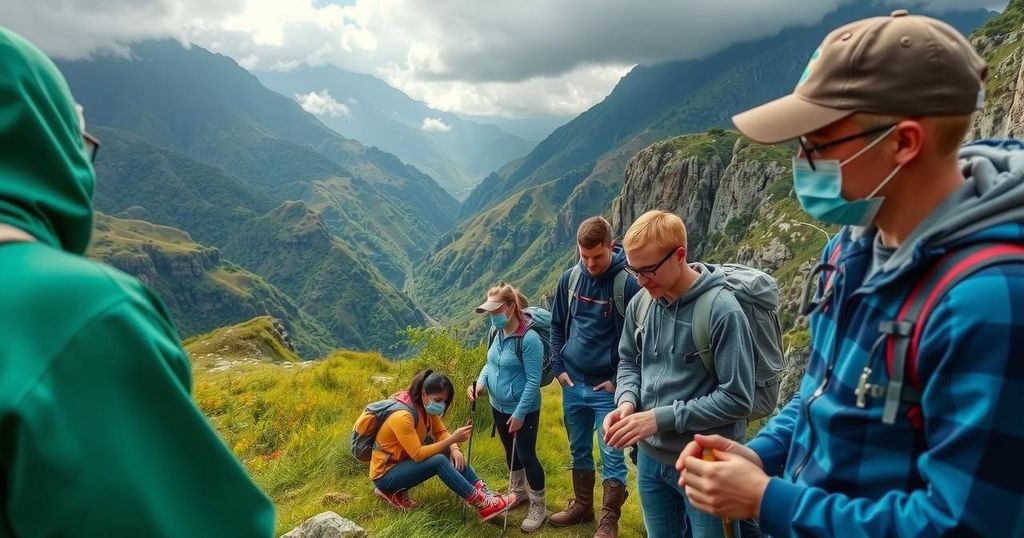UNM Alumni Climb Ecuador’s Peaks to Advocate for Prosthetic Care Access

Four UNM alumni, including Kyle Stepp, Sean O’Neill, Jacob Fox, and Allison Gordon, climbed Ecuador’s tallest peaks to advocate for access to prosthetics. Their initiative, through The Range of Motion Project, aims to enhance mobility for individuals with limb loss in Latin America. This year, they raised over $350,000 while highlighting the challenges of limited access to prosthetic care, particularly in the context of healthcare costs and insurance coverage.
Four distinguished alumni from the University of New Mexico embarked on an ambitious journey to climb some of the tallest peaks in Ecuador, advocating for increased access to prosthetic care. The group included Kyle Stepp, Sean O’Neill, and Jacob Fox, who ascended the nearly 19,000-foot Cayambe volcano, while medical resident Allison Gordon summited Chimborazo, which exceeds 20,000 feet in elevation. Their mission aimed to highlight the importance of mobility as a human right and to draw attention to the challenges faced by individuals with limb loss in accessing suitable prosthetic healthcare. According to the World Health Organization, access to assistive products, such as prostheses, is severely limited, affecting only 1 in 10 individuals in need due to financial constraints and lack of awareness. This issue is acutely felt in Ecuador, where quality prosthetic care is lacking, prompting the inception of The Range of Motion Project (ROMP) a decade ago. The initiative organizes annual climbs to raise funds and spread awareness about the necessity of prosthetics, allowing individuals with limb loss in Latin America to gain mobility and independence. The recent expedition marked ROMP’s tenth anniversary, with three teams targeting the three highest summits—Chimborazo, Cotopaxi, and Cayambe. This year’s effort raised over $350,000, contributing to nearly $1 million gathered over the program’s history for improving access to prosthetic care for underserved communities. Kyle Stepp, who himself experienced limb loss due to cancer and subsequent amputation, has been a vocal advocate for mobility rights. He expressed that seeing rehabilitated individuals reclaim their mobility was profoundly impactful, stating, “Seeing amputees walk for the first time and run for the first time reminds you why access to prosthetics is essential and life-changing.” Stepp founded the advocacy initiative So Every BODY Can Move, which promotes insurance coverage for prosthetics and orthotics necessary for physical activities—a legislative change that has already been enacted in eight states. Although the climbers faced challenges during their ascent, including altitude sickness and avalanche dangers, Stepp reflected on the experience positively, emphasizing play and freedom, which he associates closely with mobility. The initiative not only enhances awareness regarding the importance of prosthetic access but also fosters a sense of community and support among individuals with disabilities.
The topic of this article centers around mobility rights and access to prosthetic healthcare, particularly for individuals with limb loss in Latin America. Despite advancements in medical technology, many individuals in developing countries, including Ecuador, remain underserved in terms of access to assistive devices. The Range of Motion Project (ROMP) aims to bridge this gap by organizing fundraising events such as climbing expeditions to promote awareness and gather financial resources to provide necessary prosthetic care. The persistent issue of accessibility and the need for legislative changes regarding insurance coverage for prosthetics further underscores the importance of these initiatives.
In conclusion, the efforts of the University of New Mexico alumni to advocate for prosthetic care highlight the pressing need for improved accessibility and support for individuals with limb loss. Their climbing expedition not only raised significant funds but also inspired a collaborative spirit within the disability community, merging personal experiences with philanthropic endeavors. By continuing to raise awareness and push for legislative change, they strive to ensure that mobility is recognized as a fundamental human right for all individuals.
Original Source: news.unm.edu







